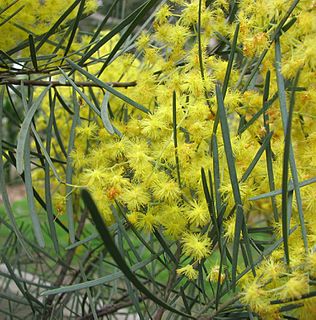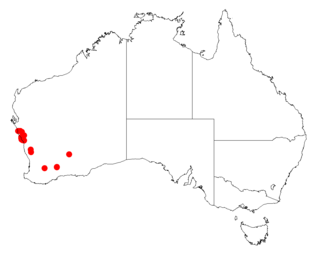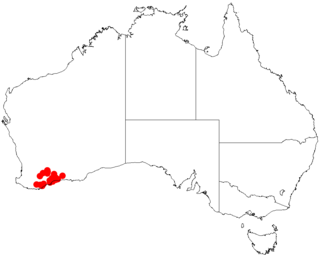
Acacia flexifolia, commonly known as bent-leaf wattle or small winter wattle, is a shrub species that is endemic to eastern Australia.

Acacia cognata, commonly known as bower wattle, river wattle or narrow-leaved bower wattle, is a tree or shrub species that is endemic to south eastern Australia.

Acacia notabilis, known colloquially as mallee golden wattle, Flinders wattle or stiff golden wattle, is a species of Acacia native to Australia.

Acacia stipuligera is a tree or shrub belonging to the genus Acacia and the subgenus Juliflorae. It is native to arid and tropical parts of northern Australia.

Acacia merrallii, commonly known as Merrall's wattle, is a shrub belonging to the genus Acacia and the subgenus Phyllodineae that is endemic to south western and southern Australia.

Acacia oxyclada is a shrub belonging to the genus Acacia and the subgenus Phyllodineae that is endemic to western Australia.

Acacia sphacelata is a shrub of the genus Acacia and the subgenus Phyllodineae that is endemic to south western Australia.

Acacia chrysopoda is a shrub of the genus Acacia and the subgenus Plurinerves that is endemic to an area of south western Australia.

Acacia tetanophylla is a shrub of the genus Acacia and the subgenus Plurinerves that is endemic to an area of south western Australia.

Acacia johnsonii, commonly known as gereera wattle or geereva wattle, is a shrub belonging to the genus Acacia and the subgenus Phyllodineae that is native to parts of eastern Australia.

Acacia torringtonensis is a shrub belonging to the genus Acacia and the subgenus Phyllodineae native to eastern Australia.

Acacia kybeanensis, commonly known as kybean wattle or kybeyan wattle, is a shrub of the genus Acacia and the subgenus Phyllodineae that is endemic to south eastern Australia.

Acacia microcarpa, commonly known as manna wattle, is a shrub belonging to the genus Acacia and the subgenus Phyllodineae endemic to south eastern Australia.

Acacia blakei, commonly known as Blake's wattle or Wollomombi wattle, is a shrub belonging to the genus Acacia and the subgenus Juliflorae that is native to north eastern Australia.

Acacia cretata is a shrub or tree belonging to the genus Acacia and the subgenus Juliflorae that is native to north eastern Australia.

Acacia rhodoxylon, also known as rosewood, ringy rosewood or spear wattle, is a tree belonging to the genus Acacia and the subgenus Juliflorae that is native to north eastern Australia.
Acacia argyrotricha is a shrub of the genus Acacia and the subgenus Plurinerves that is endemic to north eastern Australia

Acacia barattensis, commonly known as Baratta wattle, is a shrub of the genus Acacia and the subgenus Plurinerves that is endemic to a small area in South Australia where the species is considered to be rare.

Acacia microsperma, commonly known as bowyakka, is a shrub of the genus Acacia and the subgenus Plurinerves that is endemic to an area of eastern Australia]. It is rated as least concern according to the Nature Conservation Act 1992.

Acacia tephrina, commonly known as boree, is a tree of the genus Acacia and the subgenus Plurinerves that is endemic to an area of north eastern Australia. It is rated as being of least concern according to Nature Conservation Act 1992.



















